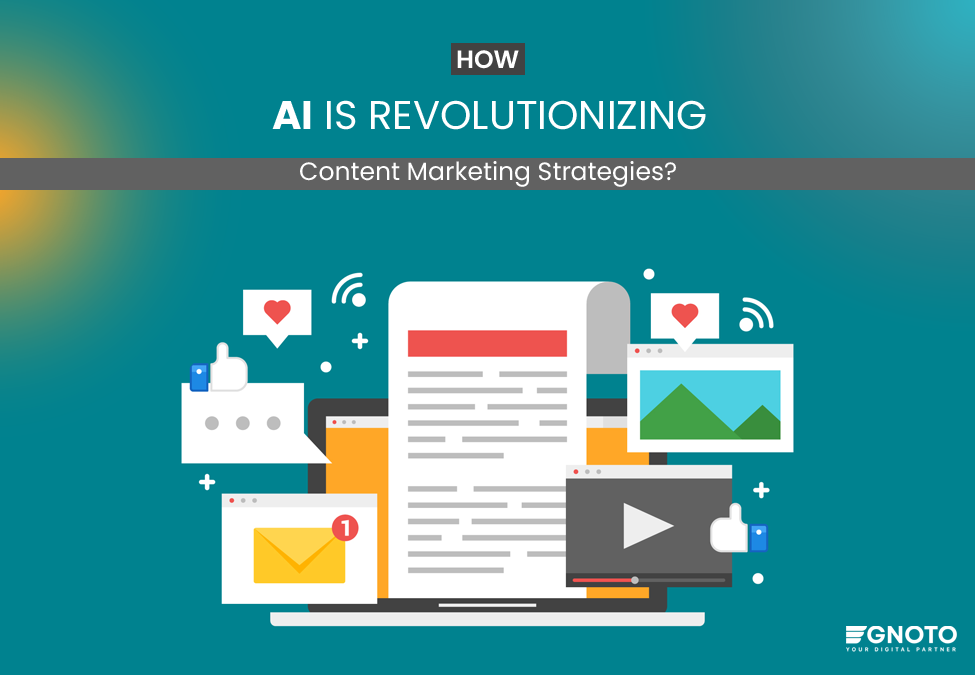You can hate or love AI, but you can’t ignore it because it has become part of our lives. Can you distinguish Deepfake from the real photos? And, can you find out whether the ad is human-run or AI-generated? The line between real and AI is getting blurred every day. AI has transformed how you strategize and create content for marketing. More than 60% of marketers agree that AI tools have enhanced their productivity and gained more customers.
From idea creation to its implementation, AI plays a crucial role at every stage. It helps you to understand customer needs and match them to your products and services. You can create and implement marketing strategies on different marketing platforms with the help of AI.
This technology saves you a lot of time that you used to put into research and customer analysis. AI not only finds your audience’s preferences and interests but also helps to target them impeccably. The global value of AI in marketing is expected to reach 47 billion US dollars in 2025. So, it is worth reading how AI shapes the current marketing landscape.
How AI Generates Content Like Humans?
AI is fed vast data from various sources, such as search engines, social media, books, PDFs, etc. Algorithms analyze this data to understand patterns and trends. These AI models understand context, patterns, and semantics. It helps them to produce videos, text, and images as per the prompt.
ChatGPT and Google Gemini are the best examples of text-based generative AI. They were built with neural networks, deep learning, and machine learning technologies. Well, they are not separate technologies; they are subsets.
AI models or tools study human behaviors thoroughly to understand how humans talk in different situations. This analysis helps tools generate content that is more like humans. Many industries are using AI in marketing and other processes. Nowadays, almost every e-commerce company uses AI Chatbots for quick replies and better customer satisfaction.
How Is AI Transforming Content Marketing?
Netflix produces exclusive titles, Zara predicts what styles and items will be popular in the near future, and H&M personalizes shopping and sustainability, all with the help of Artificial Intelligence and Machine Learning. You must have noticed both small and big companies are leveraging the power of AI to create content marketing strategies in various ways.
Here’s how AI is revolutionizing content marketing:
Idea Generation:
It used to take an entire day to generate a good marketing idea. Now, with artificial intelligence, it is a matter of seconds. With the right prompt, you can get a list of unique ideas. BuzzSumo is a popular AI tool that generates effective content ideas after analyzing trending topics and content performance worldwide.
Prompt Example: “Generate 10 innovative blog post ideas for a tech company focused on building real estate software.”
AI Tools:
- Ideanote
- Idea Generator
- Design Sparks
- YT Ideas
Automated Content Creation:
Since ChatGPT was introduced, there has been a surge of generative AI tools. According to a survey conducted in 5 countries among B2B and B2B2C marketers, around 80% of respondents reported using AI frequently for content creation. You can prepare 10 Instagram Reels and YouTube Shorts with automated content creation in 10 minutes. AI tools let you create content based on current trends and your brand voice.
Prompt Example: “Create engaging 30 social media posts for a clothing brand for men. All posts should be innovative and engaging.”
AI Tools:
- Midjourney
- IBM Watson
- Synthesia
- Clip Creator
Enhanced Personalization:
With customers having an 8-second attention span, you must win their attention and keep them on your post for at least this time frame. It is possible when you offer them personalized content. HubSpot uses AI to segment audiences according to their behavior and preferences. This way, they deliver customized emails to their customers. Moreover, creating personalized email marketing campaigns has become a cakewalk for HubSpot. Content that resonates with customer interest and needs is more likely to perform better.
Prompt Example: “Craft an email for Joy, thanking him for his recent purchase of a black coat for winter. Also, recommend similar products with 15% discount.”
AI Tools:
- Marigold
- Persado Motivation AI
- Klaviyo
- Message Gears
Content Optimization:
Content optimization helps to understand the content’s performance. Based on the performance, you can plan further content for marketing. Many AI-driven SEO tools make the process of optimization seamless. They suggest keywords and points for improvement. You can check the performance of the posts on different social media platforms and, based on their performance, make changes to the new ones. Moreover, AI helps you optimize posts for search engines as well.
Prompt Example: “Based on the information provided, suggest improvement in the content from an SEO perspective. In what areas can I improve my posts’ performance?”
AI Tools:
- Clearscope
- SurferSEO
- Hemingway Editor
- Market Muse
Data-driven Decision-making:
AI makes it easy to understand complex information. Often, you need more information about customers, content performance, product details, and others. Analyzing all the pieces of information manually, becomes a tiresome job. So, AI tools provide insights by considering all the aspects of your business growth at once and without human labor. AI also suggests changes to your strategy for better marketing planning.
Prompt Example: “Based on the last 5 years of sales on my website, show me the best-performing products. And suggest how should I create the next marketing campaign?”
AI Tools:
- Google Analytics
- TIBCO Spotfire
- TrendMiner
- Google Data Studio
Streamlined Distribution:
AI also eliminates the manual distribution of content on different platforms. You can streamline the distribution by scheduling the content. For example, if you are going to introduce a new product, use AI tools to schedule its posts in advance and increase visibility quickly. Tools also allow you to adjust the content format according to the platform. So, a major part of the work required manual work is eliminated with AI tools. By leveraging AI tools, you can stand out from the 60% of marketers who only create and post one piece of content daily.
Prompt Example: “I am going to introduce a new product for my IoT device business. They are for working mothers. I want to post on Instagram, Pinterest, Facebook, and YouTube. Format posts for these platforms specifically.”
AI Tools:
- Hootsuite
- Sprout Social
- Canva
- Buffer
Real-Time Performance Tracking:
Metrics and insights about click-through rates and conversions show how your content performs. With a little effort, you can understand what needs to be tweaked and easily optimize the content for the best results in the future. Without wasting much time and money on research and human resources, you can track the performance of your marketing campaigns and improve them accordingly.
Prompt Example: “I have been running a marketing campaign on Instagram with 2 posts in a day. These are new and trendy products for interior design. The CTR is only 3%. What should I do to improve the CTR? ”
AI Tools:
- Tableau
- Clipfolio
- ContentKing
- HubSpot
Best Practices to Successfully Use AI for Marketing
99% of marketers are using AI to create content marketing strategies. Still, most need help to create successful marketing campaigns that drive traffic and increase conversions. Everyone knows what to do but doesn’t know how to. Here are the best practices to stop you from making mistakes and help you create the best marketing campaigns.
Be Clear About Business Goals:
Clarity of business goals leads to selecting the right AI tools for marketing. Before selecting any tool, consider what you want to achieve through marketing.
- Do you want to drive sales?
- Do-you want to boost engagement?
- Do you want to personalize your customer experience?
Start Small and Scale Up:
Not every tool is suitable for every business and marketing campaign. Don’t try to use every tool. Understand the purpose of each tool and check whether it aligns with your business goals. The best way is to start using only a few tools initially, analyze their performance, and compare them with other tools. Go slow with proper tool tracking to scale up fast later.
Keep Human Oversight:
Although all the stages in content marketing strategies and implementation are automated, they still need human oversight. This ensures that things are happening right and resolves issues that AI tools cannot handle. It builds trust and prevents blunders that might occur in the absence of human oversight.
Stay Updated with AI Trends:
To stay ahead of the curve, try to keep up with the speed of the AI market. Since market landscapes are changing quickly, staying at the top of the industry requires continuous adoption of new technologies. More than 250 million people are using AI tools (Statista), making it crucial to leverage the latest AI tools to be ahead of competitors.
Train the Staff:
Often, you select the right AI tools that resonate with your business and are best for marketing campaigns, but your team can’t use them due to a lack of proper training. So, provide hands-on training to team members and allow them enough time to understand the tools. Foster a learning culture and educate them with the right resources.
The Future of Content Marketing with AI
Personalized recommendations will go to the next level in the future. Amazon and Netflix have achieved this milestone already to a certain extent.
They can personalize recommendations to the micro levels using customer data. Having a huge amount of customer data is the biggest advantage for winning the content marketing race.
But things are not as clear as they seem!
Various questions are arising in the minds of experienced and beginner marketers.
Will content still be king?
Can AI content rank?
How to assess an AI written content?
How is AI going to transform the content marketing industry?
Is content marketing still relevant?
- Since AI-generated content is flooding the market, it will push brands to create high-quality content with extra creativity to grab the attention of the masses.
- AI content will increase the competition, creating space for only cream content marketers.
- Short-form video is the future of content marketing. Around 70% of people search for products and information through Short-form videos on different platforms. Content marketing has evolved beyond traditional written format. Nowadays, short videos are the future of marketing.
- AI will become an integral part of content marketing and the entire digital marketing process.
- Creating content for social media platforms will increase compared to blogs.
Do you like to read content written by a robot? No, right. Humans like to read content written by other humans. So, use AI tools for research, idea generation, and implementation because trust will play a huge role in the future.
Conclusion
AI will be integral to every stage of content marketing, from brainstorming to content creation and implementation. Its ability to analyze vast amounts of customer data, trends, and patterns has made the lives of content marketers easy. However, human oversight will also be crucial to ensure AI tools work according to business needs and goals. In the future, more businesses will adopt AI technology because of fierce competition, making the technology a new norm in marketing.
Frequently Asked Questions
- Will AI replace content marketers?
No, AI will not replace content marketers; it will enhance their performance and save them a lot of time. - Can ChatGPT write marketing content?
Yes, ChatGPT can write creative content for blogs, social media, white papers, and other forms of content based on the prompts you provide. - What will content marketing look like in 2030?
By 2030, personalized, human-touched, and emotional content will get more views. AI will support every type of content and all the stages of marketing. - How will AI affect content marketers’ lives?
AI will handle repetitive and mundane tasks requiring less human oversight. As a result, content marketers will have more time to be more creative. AI will also help marketers execute marketing campaigns impeccably.










